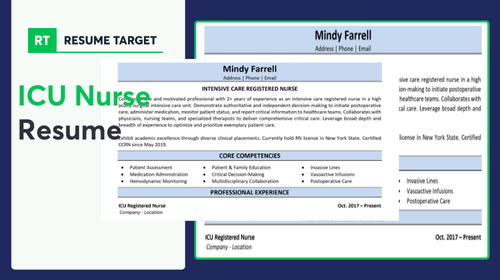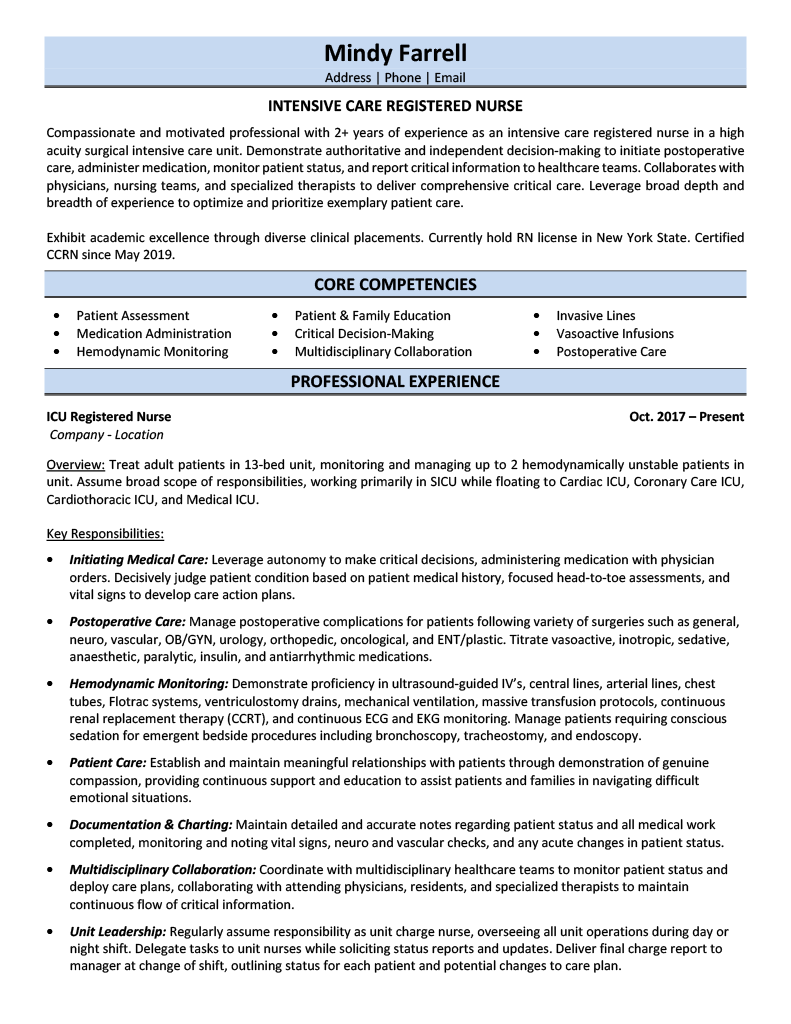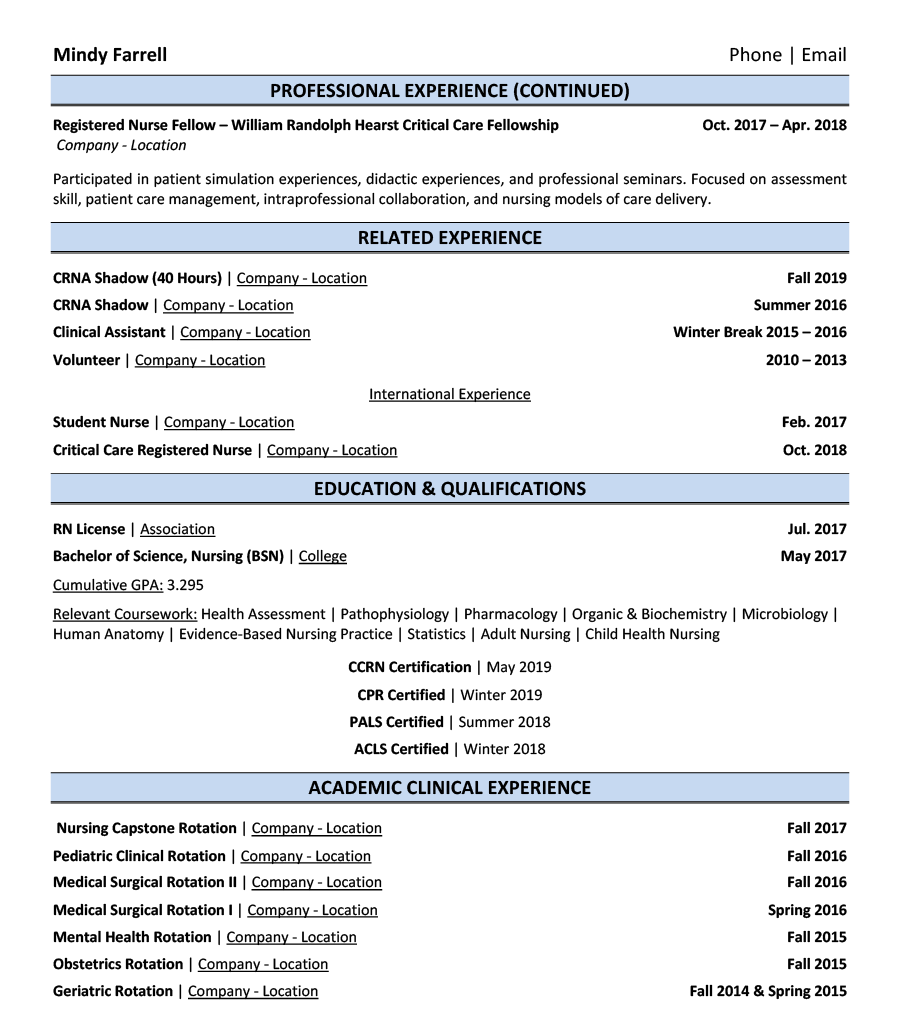

Critical care demands split-second decisions, but crafting the perfect ICU nurse resume feels like an even bigger challenge. Your daily victories in saving lives often get lost in basic job descriptions.
Are you struggling to capture the intensity and expertise of your ICU role on paper? Your resume needs to showcase both your technical mastery and your ability to remain calm under extreme pressure.
Resume Target specializes in helping ICU nurses translate their complex responsibilities into powerful career stories. We'll help you create a resume that demonstrates your critical thinking skills and your proven track record of managing life-or-death situations.


In the high-stakes environment of the Intensive Care Unit, ICU nurses serve as the vigilant guardians for critically ill patients, managing complex medical equipment like ventilators and cardiac monitors while making split-second decisions that can mean the difference between life and death.
Your role as an ICU nurse extends far beyond traditional nursing duties, as you'll coordinate comprehensive patient care plans, interpret vital medical data, and serve as a crucial link between doctors, specialists, and anxious family members during their most challenging moments.
Whether you're just starting your nursing career or looking to specialize in critical care, the path to becoming an ICU nurse offers continuous opportunities for professional growth, advanced certifications, and the chance to master cutting-edge medical technologies that are constantly evolving in this dynamic field.
Let's talk about the exciting earning potential as an ICU Nurse! Your specialized skills in critical care nursing can lead to impressive compensation, with opportunities to significantly increase your earnings through experience and additional certifications. And guess what? Specializing in areas like neuro ICU or choosing travel nursing paths can boost your income even further.
Figures from: Better Nurse
ICU nursing offers dynamic career growth opportunities, from bedside care to leadership roles. With the right certifications and experience, you can advance from staff nurse to specialized clinical positions or executive healthcare management.
Beyond basic nursing competencies, advancing in ICU nursing requires mastery of specialized critical care skills and leadership capabilities.
- Advanced cardiac life support (ACLS) certification - Critical care equipment proficiency - Ventilator management expertise - Crisis management and emotional resilienceTo become an ICU nurse, you'll need to earn your BSN degree, pass the NCLEX-RN exam, and gain critical care experience through clinical rotations and specialized certifications in intensive care nursing.
To excel in intensive care nursing, you'll need to develop essential skills like critical thinking and decision making, which you can build through progressive nursing experience in medical-surgical units before transitioning to the ICU.
Requirements from AMN Healthcare
From bustling California hospitals to East Coast medical centers, ICU nursing opportunities are abundant across healthcare settings.
Figures from Nightingale College
Struggling to capture all your critical care experience, life-saving interventions, and specialized ICU skills in a single document that will catch a hiring manager's eye? This comprehensive, section-by-section guide will walk you through creating a powerful ICU nurse resume that showcases your clinical expertise and patient care achievements.
As an ICU nurse who excels at making split-second clinical decisions, you might find it challenging to translate your life-saving skills into a compelling resume summary.
While you're focused on managing critical care patients, ventilator management, and complex medication protocols, crafting the perfect professional summary can feel as daunting as your first code blue - but it's essential for helping hiring managers quickly recognize your expertise in critical care.
How would you describe your overall approach to critical care nursing and what distinguishes you from other ICU professionals in terms of patient care philosophy?
Reason: This helps establish your professional identity and care methodology upfront, allowing hiring managers to quickly understand your nursing perspective and how you might fit into their ICU culture.
What combination of critical care specialties and patient populations have you worked with throughout your ICU career that showcase your versatility?
Reason: This question helps you articulate the breadth of your ICU experience in a concise way, demonstrating your adaptability and comprehensive knowledge base to potential employers.
How would you characterize your strongest soft skills that complement your technical ICU expertise when working with families, interdisciplinary teams, and during crisis situations?
Reason: This prompts you to highlight the crucial interpersonal abilities that set exceptional ICU nurses apart, particularly in high-stress environments where communication and emotional intelligence are as important as clinical skills.
As an ICU nurse, your skills section needs to demonstrate both your critical care expertise and your ability to handle high-stress medical situations while maintaining precise attention to detail.
Your resume should showcase advanced clinical abilities like ventilator management and hemodynamic monitoring, alongside essential soft skills such as quick decision-making and family communication during crisis situations.
Showcase your critical care expertise by organizing your nursing experience into three powerful sections: a concise role overview highlighting your unit specialization, measurable patient care achievements that demonstrate your impact, and core clinical responsibilities that spotlight your advanced life support and emergency response capabilities.
Many ICU nurses struggle to effectively showcase their life-saving interventions and critical care expertise beyond basic job duties. Transform your clinical outcomes into powerful achievements by connecting your direct patient care actions to measurable improvements in mortality rates, response times, and quality metrics.
The responsibilities section demonstrates how ICU nurses manage critical patient care beyond basic nursing duties. This section must translate complex medical procedures and critical care protocols into clear achievements that showcase your impact on patient outcomes and hospital operations.
As an ICU Nurse, your advanced certifications and specialized training are crucial indicators of your expertise in critical care. Lead with your highest nursing degree and most relevant critical care certifications, especially those specific to intensive care and advanced life support protocols.
Now that you've created a strong foundation using Resume Target's comprehensive guide, you're ready to transform your nursing resume from good to exceptional.
While many ICU nurses focus solely on customizing their cover letters, tailoring your actual resume for each critical care position is what truly sets successful candidates apart in this competitive field.
A customized ICU nursing resume not only navigates through hospital ATS systems by incorporating role-specific keywords, but it also demonstrates to hiring managers your exact match with their unit's needs, from specific monitoring equipment expertise to patient ratios and EMR systems.
Ready to make your ICU nursing experience shine? Let's transform your resume into a powerful tool that showcases exactly why you're the perfect candidate for each specific critical care position!
Don't let limited ICU experience hold you back from pursuing your dream career in critical care nursing!
Your nursing degree, clinical rotations, and any healthcare experience you've gained can create a compelling story about why you're ready for the ICU.
Focus on highlighting your clinical competencies, relevant certifications (like BLS/ACLS), and any critical care exposure from your nursing program.
For more guidance on crafting your healthcare resume, check out the Student Resume Writing Guide to ensure you're showcasing your potential as an ICU nurse.
Your nursing education and clinical rotations have equipped you with valuable hands-on patient care experience that deserves to be highlighted front and center.
Transform your clinical hours, simulation lab training, and healthcare certifications into a compelling narrative that showcases your readiness for the ICU environment.
"Dedicated and detail-oriented ICU Nurse with extensive clinical rotation experience and over 800 hours of hands-on patient care training. Demonstrated expertise in critical care monitoring, ventilator management, and emergency response procedures through simulation labs and clinical practicums. Proven track record of maintaining accurate patient documentation while delivering compassionate care. Seeking to leverage strong clinical foundation and ACLS/BLS certifications to provide exceptional critical care at [Hospital Name]."
Now's your chance to showcase the rigorous clinical training and specialized certifications that make you a qualified ICU professional!
Don't just list your nursing degree - highlight your critical care coursework, clinical rotations in intensive care settings, and specialized certifications like CCRN or ACLS that demonstrate your expertise in managing complex patient care.
unavailableRelevant Coursework: Advanced Critical Care | Emergency Care Principles | Pathophysiology | Clinical Pharmacology | Patient Assessment | Ventilator Management
Key Projects:
Critical Care Simulation Project: Led a team-based simulation focusing on managing multiple high-acuity patients in an ICU setting, demonstrating proficiency in prioritization and critical thinking under pressure.
Emergency Response Training Initiative: Designed and participated in a rapid response simulation program focusing on cardiac emergencies in the ICU setting.
Leverage your clinical rotations, nursing program expertise, and hands-on ICU experience to create a powerful skills section that showcases your ability to provide critical care while maintaining composure under pressure.
As an entry-level ICU nurse, your combination of technical expertise and compassionate care positions you well for a rewarding career in critical care, where continuous learning and professional growth opportunities abound.
When you're focused on saving lives and managing critical care situations, finding the right words to capture your impact and clinical expertise on paper can feel overwhelming.
At Resume Target, we understand the unique challenges ICU nurses face in the healthcare industry, and we've helped countless critical care professionals showcase their life-saving interventions, clinical leadership, and patient outcomes in compelling ways.
With hospitals actively recruiting experienced ICU nurses, don't let an underwhelming resume hold you back from your next career move - connect with our healthcare resume experts today to transform your clinical experience into a powerful career story.
Impress any hiring manager with our Nurse resume writing service. We work with all career levels and types of Nurse professionals.
Learn More → Nurse Resume Writing Services